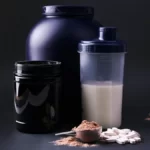
The Wonders of Whey Protein Powder: How to Boost Health with It
October 15, 2020
Unlocking the Power of Milk Powder: Uses, Benefits, and Types
October 15, 2020In the world of food production and preservation, thickening powders play a vital role yet often go unnoticed. These powders are the unsung heroes behind the scenes, responsible for maintaining the texture, consistency, and freshness of a variety of food products. From ice cream to sauces, desserts to cooked items, thickening powders quietly work their magic to ensure that your favorite foods retain their freshness and appeal for longer periods. In this article, we delve into the world of thickening powders, uncovering the hidden ingredients that make them essential in the food industry.
Understanding Thickening Powders:
Thickening powders are additives used to enhance texture, prevent separation, and increase the shelf life of foods. They are typically formulated from a combination of natural and traditional ingredients tailored to achieve specific properties in different types of foods.
One of the primary functions of thickening powders is to prevent the separation of ingredients in food products. For example, in salad dressings, thickeners help maintain the emulsion of oil and vinegar and ensure a smooth and creamy texture. In ice creams, these powders prevent the formation of ice crystals and result in a soft and creamy texture.
Hidden Ingredients:
Thickening powders are comprised of a range of ingredients, each serving its specific purpose in preserving food and enhancing texture. Some common ingredients used in thickening powders include:
Gums: Gums such as guar gum, xanthan gum, and locust bean gum are among the most commonly used thickening agents. They increase the viscosity of the mixture and improve its texture, preventing separation or thinning. For example, guar gum is known for its ability to create a smooth texture in dairy products like yogurt and ice cream.
Emulsifiers: Emulsifiers like lecithin and mono- and diglycerides are essential components of thickening powders. They help bind ingredients that naturally separate, such as oil and water. Lecithin, extracted from soybeans or egg yolks, is commonly used in baked goods to improve texture and shelf life.
Pectin: Pectin is a natural thickener extracted from fruits, especially apples and citrus fruits. It is commonly used in jams, jellies, and fruit fillings to create a gel-like texture and improve overall product consistency.
Carrageenan: Derived from seaweed, carrageenan is a versatile thickener used in a wide range of food products. Particularly in dairy products like chocolate milk and pudding, carrageenan helps create a soft and creamy texture.
Cellulose Derivatives: Cellulose derivatives like methylcellulose and carboxymethylcellulose (CMC) are often used as thickeners in various foods. They improve texture, prevent crystallization, and maintain moisture in products such as sauces, soups, and frozen desserts.
Uses in Food Products:
Thickening powders find diverse applications in various food products, from dairy to desserts, sauces to soups. Below are a few common examples:
Ice Cream: In ice cream production, thickening powders are crucial for creating a soft and creamy texture and preventing the formation of ice crystals. They ensure that ice cream remains scoopable even after extended storage in the freezer.
Salad Dressings: In salad dressings, thickeners help maintain the emulsion of oil and vinegar, prevent separation, and create a uniform texture. This ensures that the dressing coats salad greens evenly and does not become watery.
Baked Goods: In cakes, muffins, and bread, thickening powders improve texture, increase shelf life, and prevent drying out. They also help retain moisture, resulting in soft and moist baked goods.
Sauces and Gravies: Thickeners are commonly used in sauces and gravies to prevent separation and maintain a smooth texture. They ensure that sauces remain thick and creamy, even when heated or reheated.
Dairy Products: In dairy products such as yogurt, cheese, and pudding, thickening powders contribute to texture improvement, creaminess, and shelf life extension. They also prevent whey separation, which is the separation of liquid whey from solid dairy components.
The Importance of Thickening Powders:
While thickening powders may seem like small ingredients, their impact on the quality and shelf life of food products cannot be overstated. They play a vital role in ensuring that foods maintain their desired texture, appearance, and taste over time, ultimately reducing food waste and ensuring a positive consumer experience.
In conclusion, thickening powders are the unsung heroes of the food industry, working behind the scenes to create quality and freshness in a variety of food products. From ice creams to sauces, these powders play a vital role in improving texture, preventing separation, and increasing shelf life. So, the next time you indulge in a creamy scoop of ice cream or enjoy a rich and emulsified salad dressing, remember the hidden ingredients—the thickening powders—that have made it all possible.



